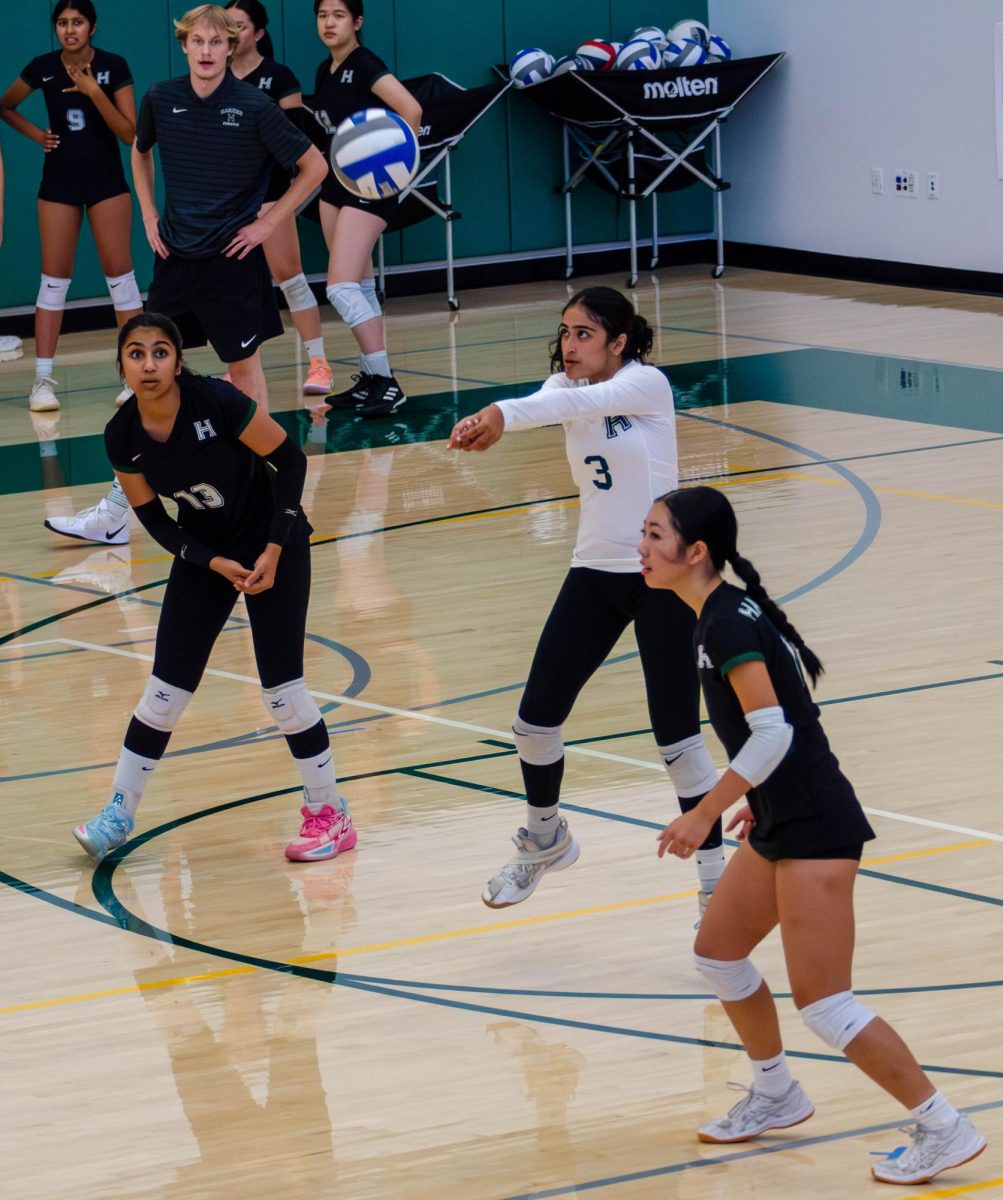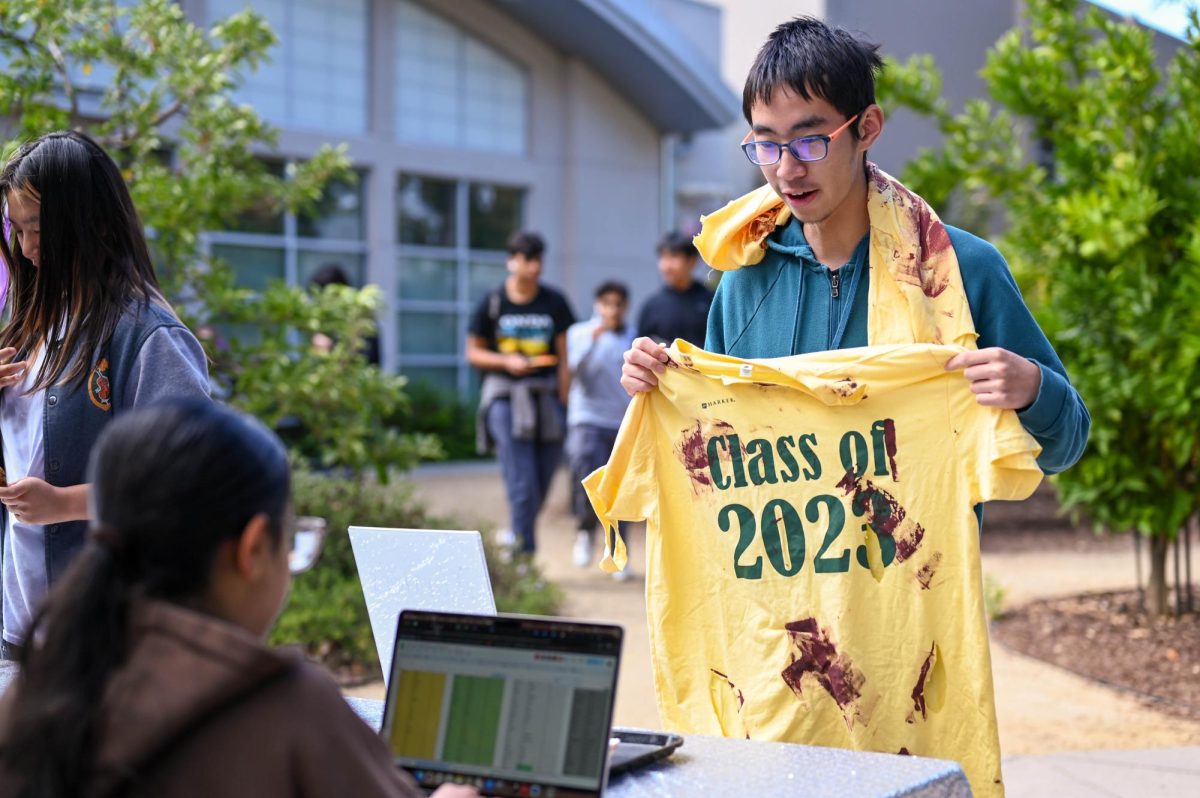Humans of Harker: Sahana Srinivasan finds balance between thinking and doing
“I believe in actively seeing flaws and problems while still enjoying and appreciating things, because nothing’s perfect, and you don’t have to hate everything and be cynical because nothing’s perfect,” Sahana Srinivasan (12) said. “I enjoy flawed things and value them even as I acknowledge that there might be something problematic.”
February 1, 2018
Picture a trampoline, full of bouncing kids. Most of the kids simply stick to monotonously bouncing up and down on two feet, perhaps sometimes sitting down until the ricochet of the springy surface jolts them back up to standing position. But some kids are inclined to act differently: they do front flips and back flips. They try doing a handstand, cartwheel and round-off despite the instability. As time passes, they master their complex tricks. These are the kids that gain a certain adeptness for trampoline-hopping; an elastic motility.
Sahana Srinivasan (12) is one of those kids. Except her trampoline is society. And her complex tricks are not a physical feat, rather a mental one. Instead of trying back-handsprings and front-somersaults, Sahana uses the art of verbal irony: sarcasm.
“I’m kind of a sarcastic person; I don’t know if you’ve noticed,” she said. “I’m kind of blunt, dry and sarcastic; they go hand in hand.”
Just as the kids who practice tricks on the trampoline become more adept, sarcastic individuals develop a mental theory which allows them think analytically, understanding the nuanced layers of emotion behind communication. Simply put, those who understand sarcasm think more.
“After I do or say something I tend to think about it a lot,” Sahana said. “And a big challenge is just trying to turn my brain off and not read into things too much. Analyzing and overanalyzing is a great skill in English class; it’s really irritating everywhere else.”
While increased analytical thinking is probably not the sole cause of sarcasm and vice versa, it is no coincidence that Sahana possesses the ability to “read between the lines,” particularly when it comes to reading people.
“I think something to death for about a day, and then I end up moving on,” she said. “And when I think about it super intensely for that one day, mostly what I’m analyzing is how actions imply intentions, and it’s me just trying to read and understand people.”
Sahana values honesty; she does not “beat around the bush.” She is not afraid to criticize things she appreciates.
“If you have a dichotomy of liking things or not liking things and if you believe in not criticizing things, then that’s kind of passively engaging with the world,” she said. “I believe in actively seeing flaws and problems while still enjoying and appreciating things, because nothing’s perfect, and you don’t have to hate everything and be cynical because nothing’s perfect. I enjoy flawed things and value them even as I acknowledge that there might be something problematic.”
Sahana finds applications for her “desire to comprehend” in her favorite class, Game Theory, and in journalism as the Editor-in-chief of the Winged Post.
“Journalism is the antithesis of ignorance,” she said. “It’s the only reason we know anything, and being a journalist in a time like the last few years has been really important because it’s really grounded me in what’s going on in the real world, taking me out of this fun high school bubble and creating a balance in my life between the personal and educating myself on the world we’re all about to go into.”
Though Sahana approaches class prepared to employ her analytical mind, she is hardly a serious person with her friends and family. Her dry, witty comments and brief, frequent chuckles paint the image of a girl free of worries, transporting her back to her childhood mindset. Sahana’s father recalled this state of her mind from when she was in her single-digit years.
“For a large portion of her life, she taught me to be,” Partha Srinivasan said. “Everybody is doing all of the time, and nobody is just being, and you won’t understand what being means until you stop doing. Stop thinking, stop moving, stop running around, stop getting completely lost in activity. If you stop doing all of that, what remains is being.”
As she has grown in the past few years, Sahana has sought out the balance between being serious and letting go of concerns.
“Even as I acknowledge the fact that I care about things a lot and get invested, I’ve learned to simultaneously let go,” she said. “I’ve learned, even as I care and take things seriously, to recognize that it doesn’t matter in the long run.”
Sahana recognizes that ultimately, her high school memories will not consist of academic endeavors; rather, she will remember both her scheduled and spontaneous hangout sessions with her friends. These are the moments where she doesn’t think so much, where she has fun.
“We’ll go to Yogurtland and since you have to pay extra money to sit in Yogurtland and eat your yogurt, we go into usually [Taylor Kohlmann’s (12)] trunk and put down the seats,” Sahana’s close friend Kate Chow (12) said. “Four or five of us will cram into her trunk and talk about things that aren’t related to school just to ease the mind. [Sahana’s] someone who can give advice and help me with whatever I need help on, whether that’s statistics or life and how to balance all of the things that are going on.”


















![“[Building nerf blasters] became this outlet of creativity for me that hasn't been matched by anything else. The process [of] making a build complete to your desire is such a painstakingly difficult process, but I've had to learn from [the skills needed from] soldering to proper painting. There's so many different options for everything, if you think about it, it exists. The best part is [that] if it doesn't exist, you can build it yourself," Ishaan Parate said.](https://harkeraquila.com/wp-content/uploads/2022/08/DSC_8149-900x604.jpg)




![“When I came into high school, I was ready to be a follower. But DECA was a game changer for me. It helped me overcome my fear of public speaking, and it's played such a major role in who I've become today. To be able to successfully lead a chapter of 150 students, an officer team and be one of the upperclassmen I once really admired is something I'm [really] proud of,” Anvitha Tummala ('21) said.](https://harkeraquila.com/wp-content/uploads/2021/07/Screen-Shot-2021-07-25-at-9.50.05-AM-900x594.png)







![“I think getting up in the morning and having a sense of purpose [is exciting]. I think without a certain amount of drive, life is kind of obsolete and mundane, and I think having that every single day is what makes each day unique and kind of makes life exciting,” Neymika Jain (12) said.](https://harkeraquila.com/wp-content/uploads/2017/06/Screen-Shot-2017-06-03-at-4.54.16-PM.png)








![“My slogan is ‘slow feet, don’t eat, and I’m hungry.’ You need to run fast to get where you are–you aren't going to get those championships if you aren't fast,” Angel Cervantes (12) said. “I want to do well in school on my tests and in track and win championships for my team. I live by that, [and] I can do that anywhere: in the classroom or on the field.”](https://harkeraquila.com/wp-content/uploads/2018/06/DSC5146-900x601.jpg)
![“[Volleyball has] taught me how to fall correctly, and another thing it taught is that you don’t have to be the best at something to be good at it. If you just hit the ball in a smart way, then it still scores points and you’re good at it. You could be a background player and still make a much bigger impact on the team than you would think,” Anya Gert (’20) said.](https://harkeraquila.com/wp-content/uploads/2020/06/AnnaGert_JinTuan_HoHPhotoEdited-600x900.jpeg)

![“I'm not nearly there yet, but [my confidence has] definitely been getting better since I was pretty shy and timid coming into Harker my freshman year. I know that there's a lot of people that are really confident in what they do, and I really admire them. Everyone's so driven and that has really pushed me to kind of try to find my own place in high school and be more confident,” Alyssa Huang (’20) said.](https://harkeraquila.com/wp-content/uploads/2020/06/AlyssaHuang_EmilyChen_HoHPhoto-900x749.jpeg)










